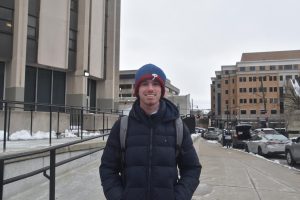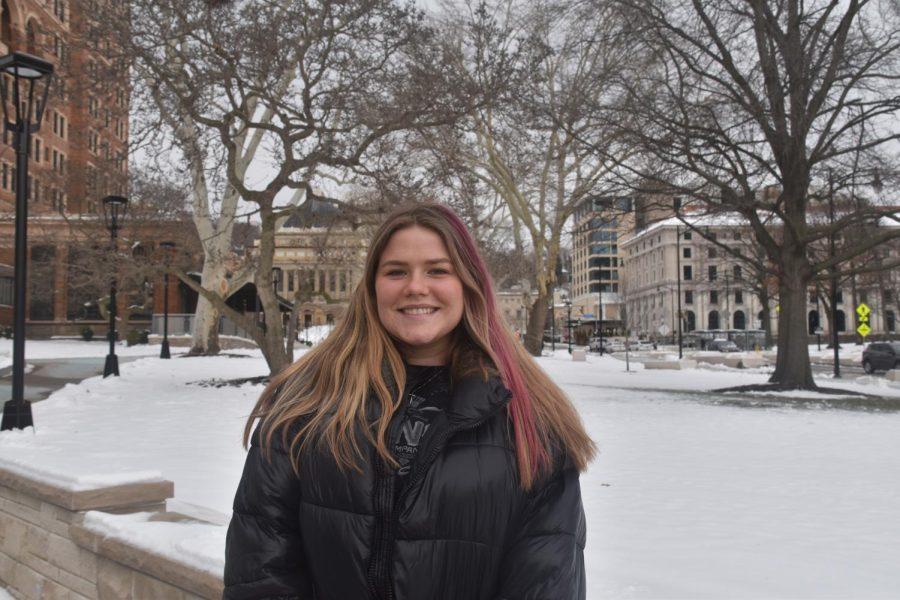Students appreciate, enjoy spring break despite lingering COVID-19 worries
Amaya Lobato | Staff Photographer
Olivia Golden, a first-year communications major.
March 14, 2022
Spring break marked two years since Pitt’s in-person classes ended with an unceremonious email telling students not to come back to campus due to the COVID-19 pandemic. Now, during the first spring break approaching normalcy since the COVID-19 pandemic, Olivia Golden said she’s ready to live her life.
“At some point, you have to just accept the fears and go on and live your life,” Golden said.
After a strange ending to spring break 2020 and the entirely online 2020-21 academic year that followed, the University moved fully back to in-person classes last semester. Golden, a first-year communications major, said she wasn’t too worried during break about another closure happening again, with mask mandates lifting and cases going down.
“Even though our school hasn’t lifted the mask mandate, which, like, I don’t have a problem with wearing a mask … I didn’t really have a fear of us closing because other schools weren’t doing that,” Golden said.
Golden, who visited a friend’s school in Washington over break, said she didn’t feel worried, because she continued taking safety measures like wearing a mask and social distancing.
“It’s come to a point where you can’t really control what people do and you know, we had over a year to get vaccinated and the people who aren’t going to do it, aren’t going to do it no matter how hard you try to convince them,” Golden said. “And you just at some point, you have to like, just accept the fears and go on and live your life.”

Dominik Bley, who is in his final year at Pitt Law, said he went to Fort Lauderdale, Florida, with a friend, and he felt like the climate in Florida helped him feel safer, but didn’t think worrying whether or not people around him were staying safe would help.
“Like, we mainly stick to ourselves, so we didn’t go party. So that was like, it’s not much different than being here. And in Florida, you can stay outside, so like, catching COVID, the chances are highly unlikely,” Bley said. “And well, the next outbreak or something similar is going to happen soon or at least in the future, but I can’t prevent it. So worrying is only going to affect my mental health.”
Despite seeing people taking fewer precautions than he did, Bley said he felt like there wasn’t much he could do about other people’s behavior.
“There was one guy in the plane who didn’t want to wear his mask, but what am I supposed to do?” Bley said. “Like, I could refrain from meeting anyone or just staying back in my room, but it’s not gonna help anyone.”

Nathan Fligelman, a first-year biology major, said he wasn’t too worried about the possibility of another semester-ending event, like during the initial wave of COVID-19, and felt the break was needed.
“I suppose it was a little bit of fear with that regard but definitely not as much as two years ago for sure,” Fligelman said. “I don’t believe I’ve had many of those concerns. I feel like the break was a necessary thing to have of course. Best to stay safe, obviously. But also got to try and enjoy a little bit too, if you can.”
While many students felt confident that the spring semester would continue in person, some were less sure. London Mussina, a sophomore microbiology major, said she was a bit nervous, but thinks classes should continue as normal as long as everyone takes precautions.
“So while I do feel bad for the community at large, I do think that as like, overall trends go down and as Pitt continues to wear masks in their classes and stuff, that will help as we return to campus,” Mussina said.
Mussina said the timing of the break worked out well for many of her friends, but turned out less fortunately for her, since one of her classes has a midterm the day after break ends.

Mussina added that she felt like the risk of the pandemic has decreased, and spring break provided a much necessary and appreciated time off for students.
“As long as we look at the next week or so, and kids who are feeling sick are diligent about getting tested and wearing masks and staying away from people, I think due to the low case numbers, the benefits outweigh the risks,” Mussina said. “It was great for everyone’s mental health. Except for mine, because I have a midterm.”



